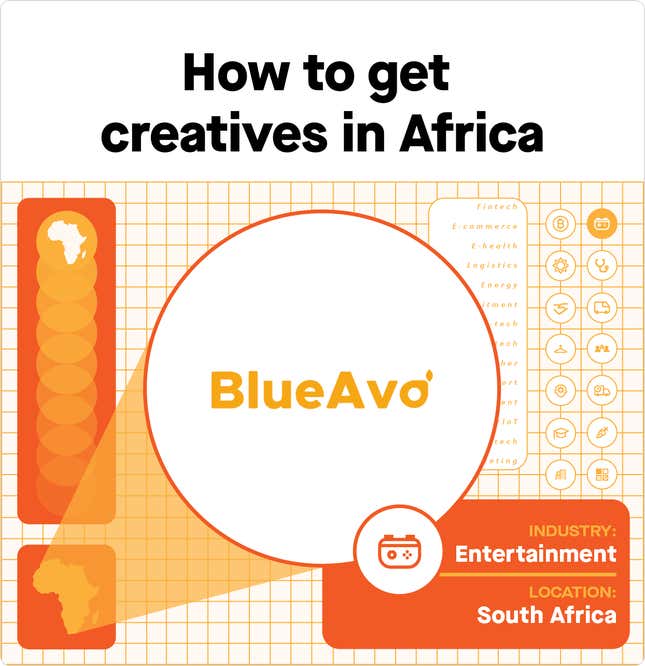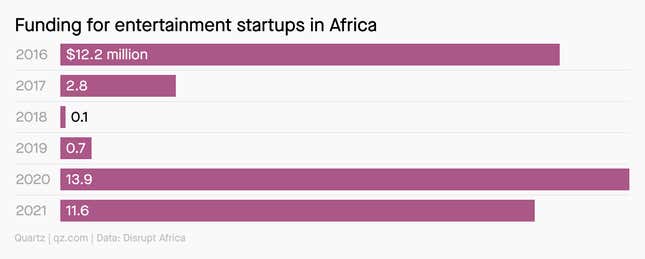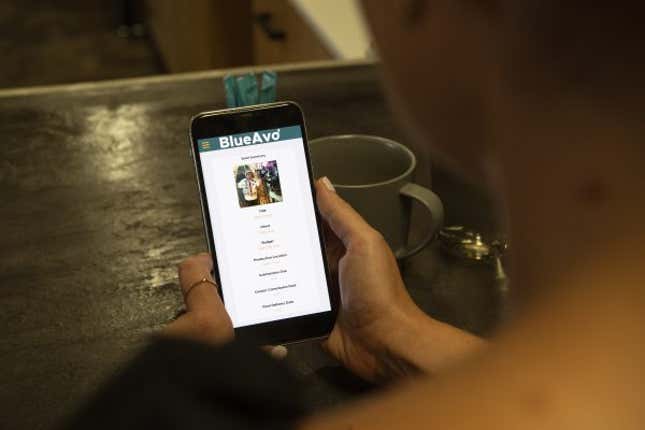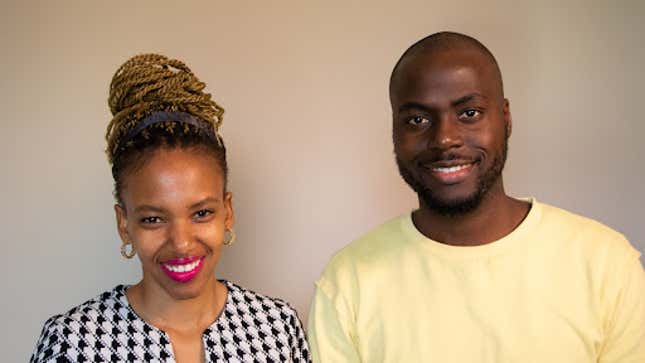
Hi, Quartz Africa members!
Welcome to the third edition of the Quartz Africa Member Brief, our weekly analysis of the opportunities and challenges available to startups on the continent. Readers of Quartz Africa Weekly are getting a free preview of this newsletter. To keep it coming to your inbox, sign up for a free trial to Quartz Africa membership.
Okay, let’s get started.
Giving talent a platform
African cultures have long inspired the world through mediums like film and music. Now—finally—investors, international companies, and social media platforms are also showing a huge appetite for the space, driven by the continent’s youthful demographic, expanded internet connectivity, and high mobile usage. As a result, local companies are receiving record funding.
That shift is opening up new and lucrative pathways for all creatives to share their work: Local and foreign venture capital firms put $13.9 million into African entertainment in 2020 and $11.6 million last year, following two years of investment below $1 million. There are opportunities for local content creators in areas such as film, TV, photography, advertising, fashion, design, and arts and crafts.
But there are challenges, too, among them the fact that projects are often still limited to small circles of brands, marketers, entrepreneurs, and creatives. “[Historically], the industry was primarily based on who you know as opposed to what you know,” says Indira Tshiteta, co-founder of South Africa-based BlueAvo, a platform that connects businesses with African creatives in music, fashion, film, and other visual arts.
Startups like BlueAvo, galvanized by the interest in local entertainment, stand to reap the benefits of a better-networked creative ecosystem. But so do creators, and even countries. Zeroing in on the gap between Africa’s known talent and its unknown potential talent is the sector’s next enormous opportunity.
Cheat sheet
💡 The opportunity: Local and international businesses are often looking for talent (for example, to produce a video or execute a graphic-design project), but the landscape of African creatives still has lots of room for discovery. Being a connector has potential.
🤔 The challenge: Africa’s creative talent pool is fragmented across different countries.
🌍 The road map: Centralized databases of creatives, plus technology that pairs them up with businesses in need of talent, could be the most efficient way to secure services upon request.
💰 The stakeholders: Africa-focused VCs like Kepple Africa Ventures, Musha Ventures, Ingressive Capital, Lateral Capital, and Chandaria Capital are investing in Africa’s creative industries.
By the digits
$11.6 million: Total funding raised by African entertainment startups in 2021
0.5%: Portion of all Africa funding that went to entertainment startups in 2021
14: Number of African entertainment startups that received funding in 2021
3: Number of African entertainment startups that raised $1 million+ in 2021
Portion of all African startup funding that went to fintech startups in 2021
$20 million: Funding raised by South African mobile game publisher Carry1st this year
$3.6 million: Funding raised by Egyptian creator economy platform Minly in 2021

The case study
Name: BlueAvo
Founded: 2019
HQ: Cape Town, South Africa
Founders: Isaac and Indira Tshiteta
Latest valuation: Undisclosed
BlueAvo is a tech platform that connects brands, entrepreneurs, agencies, and other content seekers with content creators in Africa.
Here’s how it works: Creatives sign up on the platform, are verified by BlueAvo based on their IDs and photos to ascertain their identities, and take assessments to make sure they have the right skill sets. Once verified, they’re added to a database, where content seekers also use the platform to post briefs about the work they want done, including specifications, location, and available budget.
BlueAvo verifies content seekers’ information, then notifies the creator network of the available work. Those who are interested submit a proposal detailing how they’d do the work; BlueAvo goes through these and submits the top five creator treatments to the content seeker, who then chooses one to work with.

The client sends funds to BlueAvo to keep in an escrow account, and BlueAvo pays the content creator upon successful delivery and with the client’s approval. Along the way, BlueAvo handles the legal and intellectual property agreements between the parties, taking a 20% commission for its trouble.
BlueAvo has seeded connections with creatives in Nigeria and South Africa. Recent examples include Cape Peninsula University of Technology in South Africa hiring the services of three voiceover artists to create a bilingual glossary for one of its departments, and Dubai-based agency Plus Four Studios hiring a graphic designers from Nigeria. In the fourth quarter of 2021, BlueAvo says it made more than $97,000 in revenue.
In conversation with

Isaac and Indira Tshiteta, co-founders of BlueAvo, come from different but complementary backgrounds: Indira ran a media content creation company, while Isaac was in software development. Here are some key quotes from our conversation.
✋🏿 On BlueAvo’s model:
“What we wanted to do was specifically use technology as a tool to democratize opportunity.”
🔮 On the company’s vision:
“To see a pipeline of commercial opportunities being available to creators across the continent despite who they know, and literally just a democratization of opportunity for all.”
📋 On the regulatory environment:
“Africa is catching up to the tech solutions of the world and so it’s constantly creating new laws and all these legislations to basically adapt.”
Entertainment deals to watch
Carry1st, a Cape Town–based mobile game publisher, raised $20 million this year in a round led by VC firm Andreessen Horowitz, with participation from Google, Riot Games, and rapper Nas.
iROKOtv, a Lagos-based video streaming service, raised $19 million in 2016 from the French TV company Canal+ and the Swedish investment company Kinnevik AB.
Mdundo, a Nairobi-based music streaming and downloading service, raised $6.4 million in 2020 in an IPO at the Nasdaq First North Growth Market Denmark.
Learn more with Quartz Africa
📈 The ascent of African entertainment
🤐 Africa’s entertainment deals are going down in the DMs
🏃 The biggest music companies scramble to sign African artists
🧐 Here are the homegrown competitors facing Spotify in Africa
🎵 The Angolan dancers who took “Jerusalema” global
🤑 How Boomplay is monetizing music for African artists
🎵 This brief was produced while listening to “Thank you Mr DJ” by Yvonne Chaka Chaka (South Africa)
Have a highly motivated rest of your week.
—Carlos Mureithi, east Africa correspondent
One 🎬 thing
Just how important is Africa’s creative sector to the economy? The potential is vast: Africa’s film and audiovisual industries alone have the potential to create more than 20 million jobs and generate $20 billion in revenue per year. Nigeria’s Nollywood, the continent’s largest film industry, makes about 2,500 productions a year. In the recent past, more of these productions are gaining global recognition and being featured on global streaming platforms.
